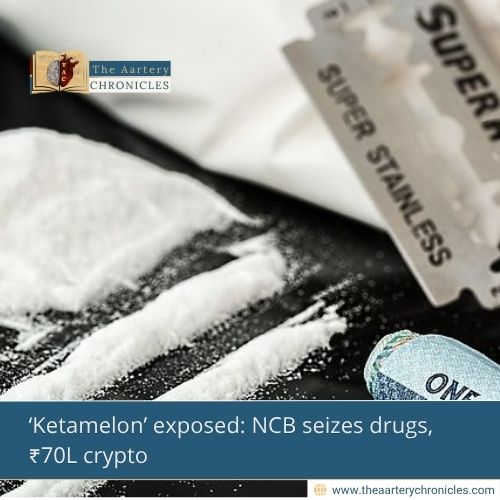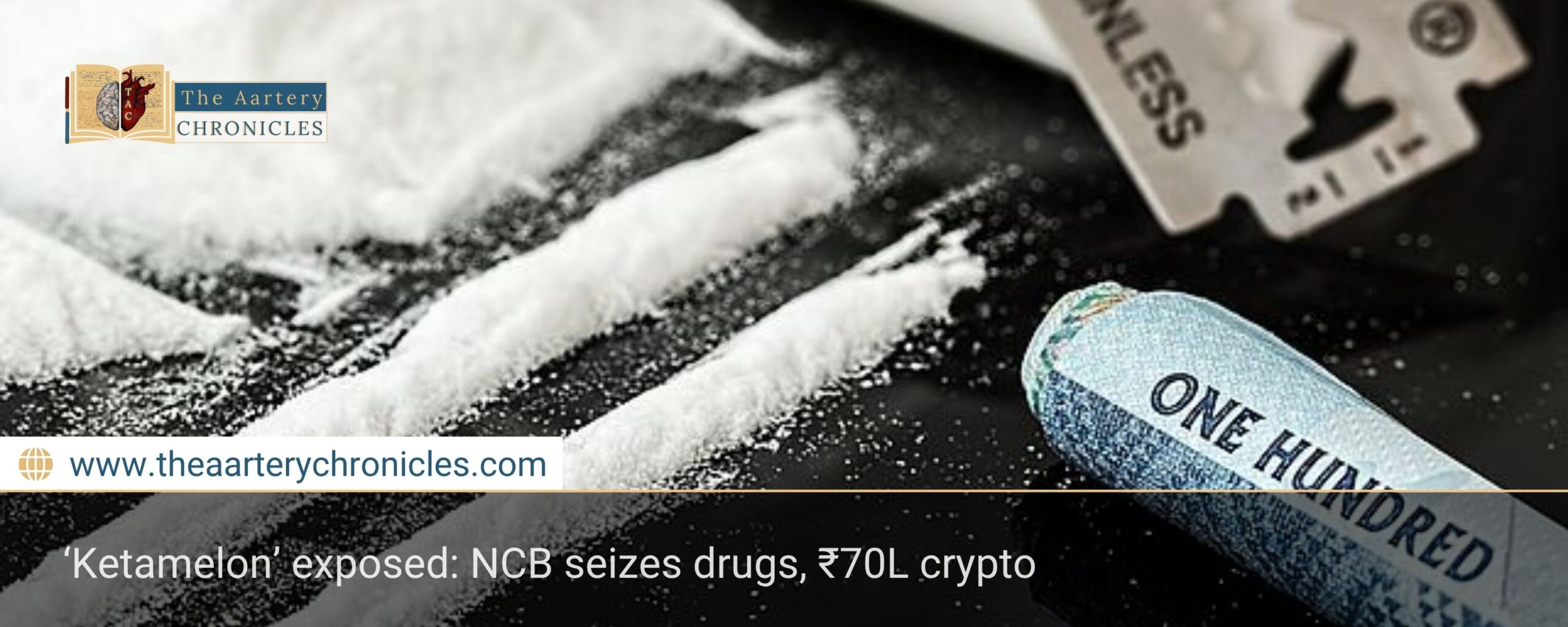

‘Ketamelon’ exposed: NCB seizes drugs, ₹70L crypto
In a major blow to the illegal online drug trade, India’s Narcotics Control Bureau (NCB) has successfully dismantled a high-level darknet operation distributing powerful psychoactive substances across the country.
This development follows a months-long investigation led by the NCB’s Kochi (Cochin) zonal team under the mission code “Operation Melon.”
What the Authorities Seized
Following intelligence surveillance, officials intercepted three suspicious parcels at a Kochi postal facility on June 28, 2025. This led them to conduct a targeted search at the suspected sender’s residence, where they uncovered:
- 1,127 LSD blot papers
- 131.66 grams of ketamine
- A variety of digital storage devices
- Cryptocurrency wallets, including a hardware wallet containing ₹70 lakh worth of USDT
In addition, investigators found a bootable KITES operating system, which is often used to anonymously browse darknet markets.
Two individuals have been detained in connection with the case, and further inquiries are underway.
A Hidden Network Uncovered
The syndicate, operating under the alias ‘Ketamelon’, was active for more than two years and specialised in shipping banned hallucinogenic drugs, primarily LSD (Lysergic Acid Diethylamide) and ketamine, to several major Indian cities. These included Delhi, Bengaluru, Chennai, Bhopal, and Patna, along with areas in Himachal Pradesh and Uttarakhand.
Authorities believe that the group used courier services to discreetly deliver more than 600 drug parcels over just 14 months.
Understanding the Drugs Involved
Both substances involved in this case are classified as psychoactive drugs, known to affect brain function:
- LSD, commonly known as acid, is a powerful hallucinogen that alters perception, mood, and consciousness. It is often sold on small pieces of paper called blotters, which are placed on the tongue.
- Ketamine, originally developed as an anaesthetic, is now frequently abused for its dissociative and euphoric effects. High doses can lead to confusion, memory loss, and addiction.
The street value of the LSD alone was estimated at ₹35.12 lakh, with each blot selling for around ₹2,500–₹4,000.
How the Darknet Enables Drug Crime
What makes darknet drug markets especially dangerous is their ability to mask identities and locations using advanced encryption tools. Payments are typically made using cryptocurrencies, which are harder to trace than traditional money.
In this case, the seized hardware wallet and digital evidence point to sophisticated money-laundering methods and a likely international supply chain. According to officials, the drugs were sourced from an overseas supplier in the UK known by the pseudonym Gunga Din, who is reportedly linked to Dr. Seuss, a global figure in the LSD black market.
How This Case Compares to Past Busts
This isn’t India’s first large-scale darknet drug bust. In 2023, the NCB disrupted another massive LSD operation called ‘Zambada’, arresting 14 people and seizing 29,013 LSD blotters, 472 grams of MDMA, and ₹51 lakh in cash. That network was connected to the same international source and had plans to expand across India.
Darknet vendors are often classified by a 5-level rating system, which assesses both the potency of the drugs and the customer service. ‘Ketamelon’ was considered a Level 4 vendor, a rare and high-ranking status on these illicit platforms.
Public Health Implications
As synthetic drug use spreads across India, especially through hard-to-monitor online channels, public health experts are raising concerns. The substances involved particularly LSD and ketamine carry serious risks including psychosis, dependency, and in some cases, permanent brain changes.
This case highlights the urgent need for:
- Public awareness campaigns
- Robust digital surveillance
- Early intervention programs for youth and urban populations
Conclusion
The successful takedown of the ‘Ketamelon’ network is a major victory for Indian law enforcement in the digital age. However, it also serves as a wake-up call: illegal drug trade is evolving, and so must our strategies to fight it.
Source: Inputs from various media Sources

Priya Bairagi
Reviewed by Dr Aarti Nehra (MBBS, MMST)
I’m a pharmacist with a strong background in health sciences. I hold a BSc from Delhi University and a pharmacy degree from PDM University. I write articles and daily health news while interviewing doctors to bring you the latest insights. In my free time, you’ll find me at the gym or lost in a sci-fi novel.








